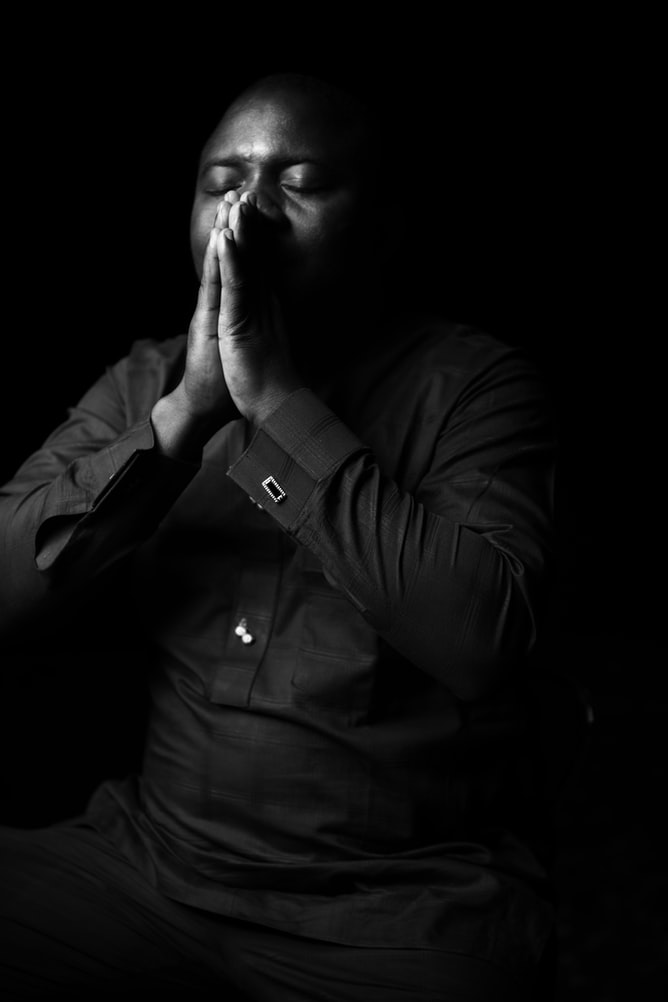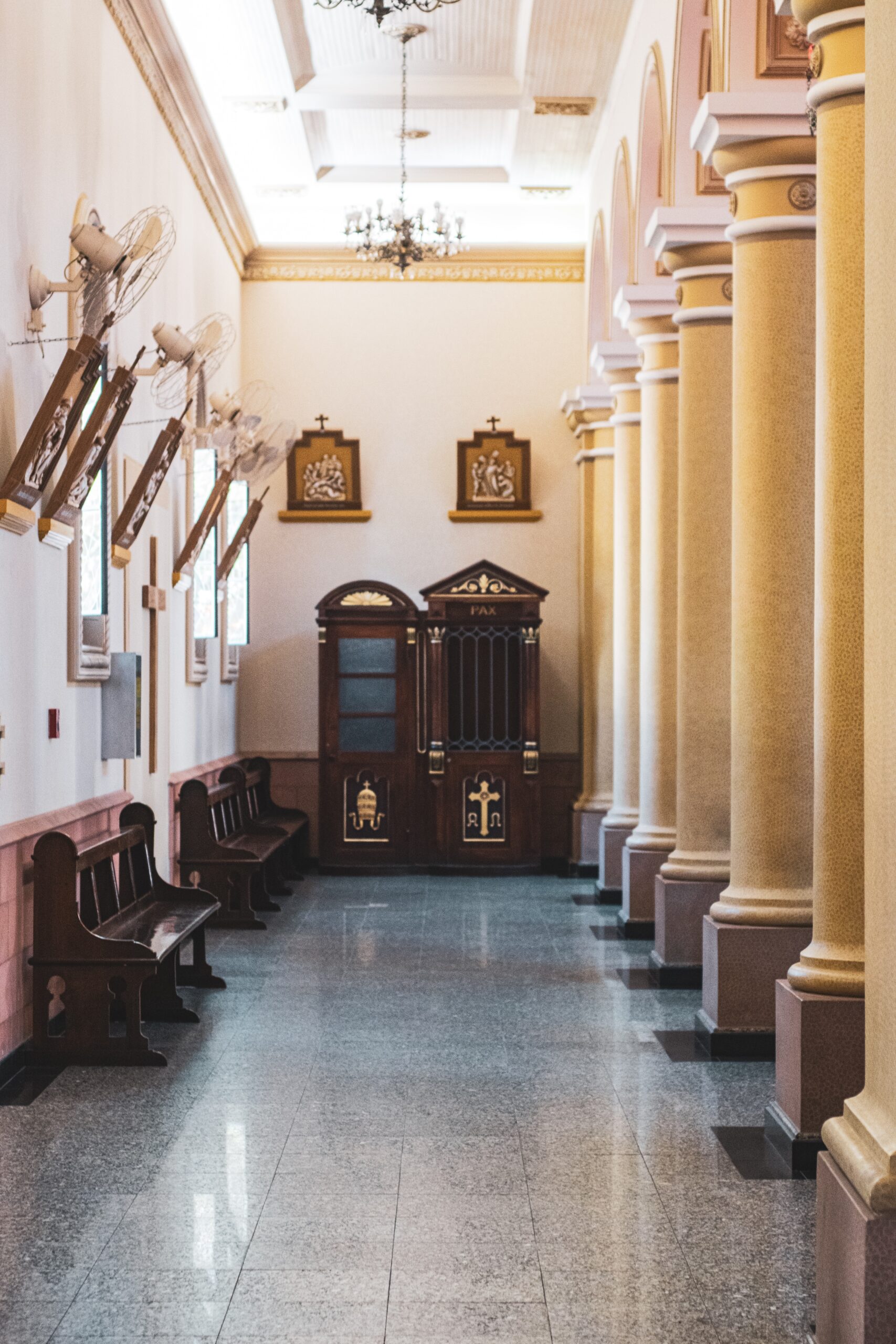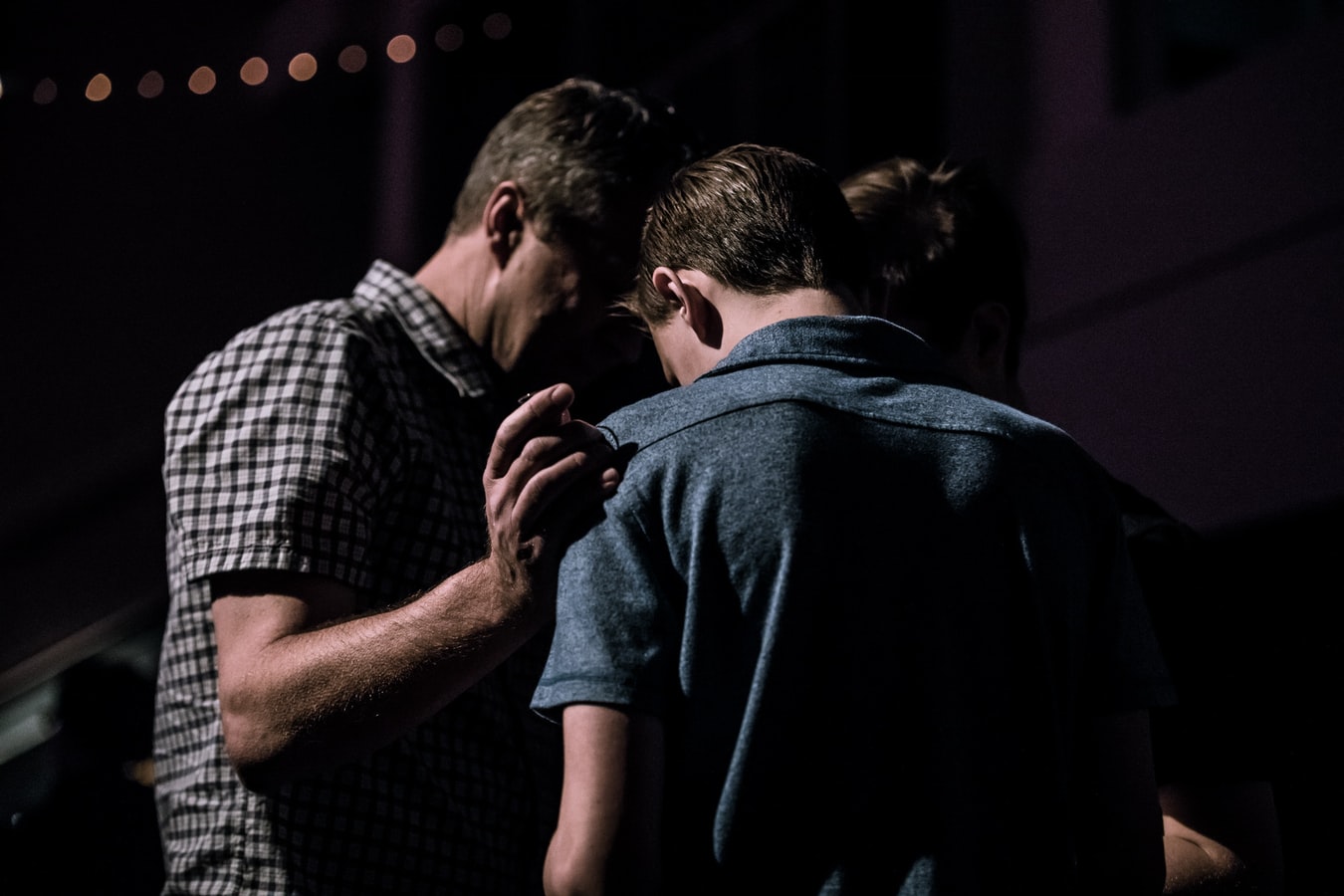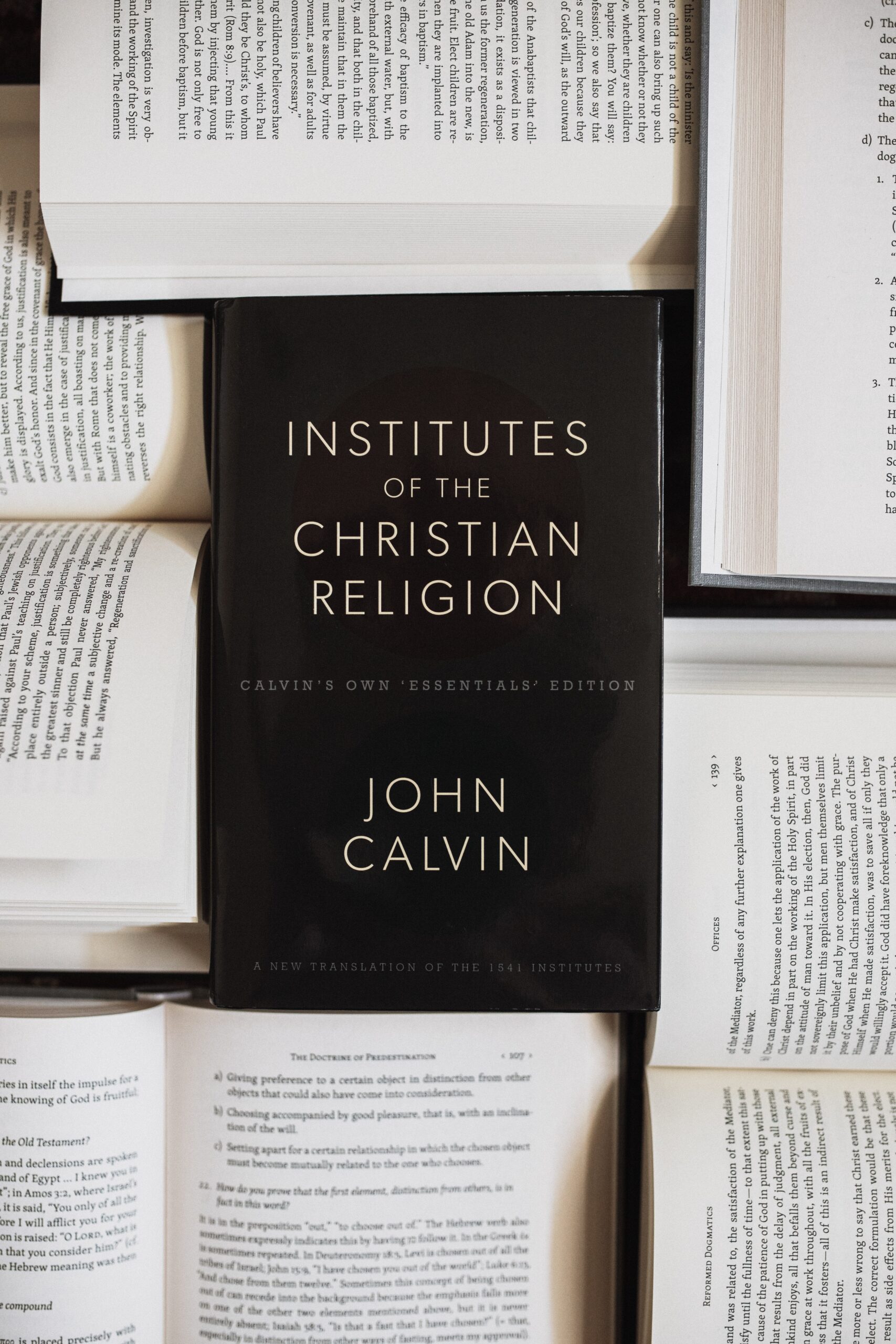When I was inquiring into the Orthodox Faith, the Sacrament of Confession wasn’t just a stumbling stone for me —it was more like a massive boulder blocking the road to Orthodoxy.

My whole life I had been taught the importance of confessing my sins to God and repenting of them—turning away from my wayward path and back to Him. I was even encouraged to review the day before going to bed and confess any sins in thought, word, and deed, asking for God’s forgiveness and cleansing.
This is a very good practice for all of us. But those moments of confession were always private—part of my personal prayer life. I confessed my sins to God alone. Sometimes I might need to ask forgiveness from someone I had wronged, but otherwise my sins were God’s business, and nobody else needed to be a part of it.
As we examine the Orthodox Church’s approach to confession, I am well aware that many Church Fathers over the past 2,000 years as well as modern-day priests have written articles, homilies, and theological works about confession and repentance. So I want to make clear at the get-go that I have no intention of laying out a comprehensive theology of confession in one little blog post.
For one thing, I’m not qualified.
My purpose here, as the blog subtitle states, is to examine the experiential difficulties of “living and learning Orthodox Christianity”—in this case, wrestling with the concept of confession. So think of today’s post as a highlight reel of some of the things that helped this particular Evangelical Protestant gal in the pews to accept and ultimately embrace the Sacrament of Confession.
As for those relevant questions of theology and history, one of my sources is a book that I highly recommend: Know the Faith: A Handbook for Orthodox Christians and Inquirers by Rev. Michael Shanbour, available from the Ancient Faith store. Each chapter explains a specific Orthodox doctrine, so you can treat it as a reference book and just flip to the topic you need. What sets this book apart from other introductory books on the Orthodox Faith is that Fr. Michael first explains the Orthodox teaching on a subject clearly and succinctly, then he addresses it through the relevant Scripture passages, in the writings of the Church Fathers, in Roman Catholic teaching, and in the teachings of the Protestant Reformers. It’s eye-opening to discover that we use a lot of the same terms, but their meanings have changed over the centuries among various Christian groups.
Confession in TV and Movies
As someone who was born and bred Protestant, my only experience with confession before a priest was through fiction—mostly television. You’ve probably seen this storyline dozens of times too, especially in crime shows: A distraught character enters a church then sits in one side of an ornate, wooden confessional booth while a priest sits on the other side, a wall between them with a small, square screen that allows them to talk.

The character says, “Forgive me, Father, for I have sinned; it has been X number of days/weeks/years since my last confession.” Then he or she recites a short list of sins, such as, ”I haven’t attended church in three years,” “I cuss a lot,” and “I murdered my business partner this morning” because, hey, it’s a crime show. Every now and then a deep discussion will follow, but most TV shows feature a priest who mumbles a few platitudes then assigns a penance that seems completely unrelated to the offense—say, ten Hail Mary’s.
All of this was already strange and foreign to me, but next came the part of the scene that always made me really uncomfortable. The priest would make the sign of the cross then say, “I absolve you,” or Te absolvo if it was a Latin-heavy church.
And I would think, “You don’t have the power to do that.”
The Sacrament of Confession seemed unbiblical, a definite overstepping of spiritual authority, and, well, very Roman Catholic. I didn’t know at the time that not only is the Eastern Orthodox approach to confession different from the Roman Catholic one, the Orthodox understanding of the purpose of confession and the role of the priest in it is also different from the West.
So let’s start there, with the role of the priest. Does an Orthodox priest really have the power to forgive people’s sins?
Differences between Orthodox and Roman Catholic Views
I had been attending a small parish of the Orthodox Church in America, or the OCA, and a few monks were visiting from St. Tikhon Seminary in Pennsylvania. I was really looking forward to hearing them speak, because I had never seen an actual monk in person before. And I was doing my best to banish from my mind any visions of chanting monastics from the movie Monty Python and the Holy Grail. I think I was expecting Men in Black who would be very solemn and mysterious, so I was impressed with their warmth and their obvious love for Christ and His Church.
I remember only one specific thing that one of the monks said, almost in an off-hand way. As he was giving his message, he brought up the Sacrament of Confession and said, “I don’t forgive sins. Only God can do that. I am merely a witness before God that you have repented of your sins.”
Now, that I could understand. Inwardly, I breathed a sigh of relief. A year later, a different monk from the West Coast said virtually the same thing at my parish. He said, “I don’t forgive sins. Who am I? I am a witness before God that you are sincere in your repentance.”
Over the years I have heard various priests say a version of these words. But that first time of hearing this idea—of priest as a witness—did something for me. It helped me to realize that the Orthodox view of the priest’s role is not the Roman Catholic view.
In Eastern Orthodoxy, the grace of the Priesthood of Christ is in the priest, but we make our confession to Jesus Christ, and God forgives the penitent through the priest. In contrast, the Roman Church has a theology of the power of the priesthood that means confession is made to the priest. This is what we see on television and in the movies, because Orthodoxy is largely unknown in American media. In the Roman Catholic prayer of absolution, the priest says, “I absolve you.” But the Orthodox priest says, “May God forgive you, through me, a sinner.”
Confession in the Bible and in the Early Church
There are four verses in the New Testament that deal with confession of sin:
- The Gospels tell us in Matthew 3:6 and Mark 1:5 that crowds of people were baptized by St. John the Baptist in the Jordan River, “confessing their sins.”
- Acts 19:18 records that in the early Church, “many who had believed came confessing and telling their deeds.”
- And James 5:16 commands us, “Confess your trespasses to one another, and pray for one another, that you may be healed. The effective, fervent prayer of a righteous man avails much.”

I learned that last verse in high school as part of a Scripture memory program. I remember that the emphasis was on the second part of the verse: “The effective, fervent prayer of a righteous man avails much.” We focused on the power of intercession—the importance of praying for one another—rather than on the part about confessing sins verbally. If anyone talked about confessing to one another, the topic was viewed in terms of voluntary accountability to another believer, not as an actual command.
I was not taught that the noun form of the verb “confess,” exomoloyisis in Greek, means “to agree with out loud.” It’s the same word that is used in another popular memory verse, 1 John 1:9: “If we confess our sins, He is faithful and just to forgive us our sins and to cleanse us from all unrighteousness.” That verse, to Greek hearers, had imbedded within it an understanding of verbal acknowledgment of our sins—“if we confess out loud.” But in my experience the verse was interpreted, along with all the others, with the Protestant assumption of confessing our sins privately to God.
As I continued reading and listening to Orthodox clergy, I learned that in the early Church, confession really was public, which we can see in those verses; individuals confessed their sins in the presence of the community. And this practice didn’t end with the Book of Acts.
The Didache, a first-century document written during the heart of the New Testament era, around AD 70, contains this instruction in 4:14: “Confess your sins in church, and do not go up to your prayer with an evil conscience. This is the way of life.”
Later in 14:1 the Didache reiterates, “On the Lord’s Day gather together, break bread, and give thanks, after confessing your transgressions so that your sacrifice may be pure.”
But that early Christian practice of group confession didn’t last long. As you can imagine, the act of revealing personal struggles and failings to a bunch of people could lead to gossip, and inquirers or immature believers might be scandalized and discouraged by others’ sins. I’m sure both happened.
As a result, this form of public confession became impractical as the Church grew. In the Q&A section of www.oca.org, the article “Confessing in the Presence of a Priest” notes that “it was the priest who ‘stood in’ for the community, as its presiding officer and as its witness to the penitent’s repentance.”
This practice of the priest, instead of the entire community, hearing confessions continued in the Church as a normal part of the Faith. In the third century, Origen wrote that a believer should “not shrink from declaring his sin to a priest of the Lord and from seeking medicine,” and in the same era St. Cyprian of Carthage wrote, “Of how much greater faith and salutary fear are they who . . . confess their sins to the priests of God in a straightforward manner and in sorrow, making an open declaration of conscience” [Know the Faith, p. 259].
I didn’t know these things about the early Church because, in practice, Church history in the Protestant world has some serious gaps. In my experience, it often consisted of the Old Testament, the life of Christ, and the Book of Acts. We generally skipped over the next 1,300 years or so, except to look with some amusement at stories of dueling popes excommunicating each other. We then picked up in the late 1400s with the corruption in the Roman Catholic Church, especially the selling of indulgences, and when a monk named Martin Luther nailed his 95 Theses to the door of All Saints’ Church in Wittenberg, Germany, that’s when church history really began. We learned next to nothing about Eastern Christianity, although, thank God, that appears to be changing.
Looking back, I probably assumed that confession before a priest was something that developed in the Middle Ages. I don’t remember; I didn’t ask the right questions. But the move from public confession to the safer confines of one-on-one confession with a priest happened early.
Even then, it wasn’t a novel idea. We can read in Leviticus that the children of Israel, as part of their temple worship, gave sin offerings. This, of course, was a very public form of confession and penance.
Then, in 2 Samuel 12, after King David took Bathsheba as his wife and made sure her husband Uriah died in battle, he admits his sin verbally before Nathan the Prophet. Significantly, Nathan responds to David by saying, “The Lord also has put away your sin; you shall not die” (v. 13). David received God’s forgiveness through Nathan. Somehow, probably because of the filters in my own mind, I had never noticed that or given it any thought.
The various temple sacrifices, of course, were part of the religious system that Jesus was born into, that the Virgin Mary and Joseph the Betrothed practiced. It was the religion of the disciples.
Confessing Sins in Actual Practice
In the Evangelical world, of course, confessing to a priest is not an option on the table. So, when we’re struggling spiritually, instead of the priestly route, we might make an appointment with our pastor or pay a counselor to help us deal with our anger or infidelity or loss of faith. We might talk to a friend or spiritual mentor. These are all good things—counseling can be invaluable, and it’s a blessing to have a close friend who will help carry our burdens and pray for us.
But in actual practice, as humans we tend to respond in one of two ways to St. James’s often-memorized command to “confess your trespasses to one another, and pray for one another, that you may be healed.”
1. We don’t actually do it.
There are very good reasons for not sharing our sins with others: fear of rejection, the danger of gossip and judgment, and difficulty finding someone to trust, for starters.
2. We confess our sins to anyone but a priest.
The results are often mixed. The OCA article I mentioned earlier states,
It is often the case that those who object to revealing their sins in the presence of a priest or to seek his advice have no qualms about revealing their sins to their neighbors, friends, psychiatrists, and so on, usually with the intention of obtaining advice—advice that is not necessarily godly or spiritually profitable, or even just plain “good,” for that matter.

I had to admit the truth of this. Years ago, a coworker of mine made an appointment with a self-advertised Christian counselor. At their first meeting, he asked her birthdate then riffled through a huge book of astrology to look for wisdom through her Zodiac sign.
Another friend was struggling in her marriage and confided in an older woman at her church. In my circles, an older, faithful Christian woman was often referred to as a “Titus woman,” a nod to Titus 2:3, which admonishes “the older women” to “be reverent in behavior, not slanderers, not given to much wine, teachers of good things.”
Unfortunately, in this case the older woman offered counsel out of her own woundedness and actually caused great damage to my friend’s soul and to her marriage. And from my personal experience I could list numerous examples of well-meaning lay Christians misinterpreting Scripture and coming up with some very odd or even harmful advice.
The OCA article also notes that refusing to seek out a priest for confession “is somewhat akin to the person who finds a huge lump on his or her body, goes to the doctor, and then asks the receptionist to diagnose it.” (Okay, even if you disagree with that point, you’ve gotta admit—That’s funny.) The article continues, “Yes, one can confess directly to God—but refusing to confess in the presence of a priest implies that one can also be one’s own spiritual physician.”
I had never thought of it that way.
The Apostolic Grace of the Priesthood
In AD 374 St. Basil, Bishop of Caesarea, affirmed,
It is necessary to confess our sins to those to whom the dispensation of God’s mysteries is entrusted. Those doing penance of old are found to have done it before the saints. It is written in the Gospel that they confessed their sins to John the Baptist [Matt. 3:6], but in Acts [19:18] they confessed to the apostles. [Know the Faith, p. 260]
Ah, the apostles. That leads us to the thorny problem of one of Jesus’ difficult sayings in a short passage from the twentieth chapter of John. After His Resurrection, Jesus appeared in the room where the disciples were assembled, and “He breathed on them, and said to them, ‘Receive the Holy Spirit. If you forgive the sins of any, they are forgiven them; if you retain the sins of any, they are retained’” (vv. 22-23).
Saint Matthew also records Jesus telling His disciples, “I will give you the keys of the kingdom of heaven, and whatever you bind on earth will be bound in heaven, and whatever you loose on earth will be loosed in heaven” (16:19).
In the article “Confession: The Healing Sacrament” on the website of the Antiochian Archdiocese, author Jim Forest notes, “The keys of binding and loosing sins were given not only to one apostle but to all Christ’s disciples, and—in a sacramental sense—to any priest who has his bishop’s blessing to hear confessions.”
This understanding of a special grace of the priesthood to hear confessions and pronounce God’s forgiveness has been the historical understanding of the entire Church, East and West. It is only in the past 500 years or so that the practice has been questioned. But once I understood this, I still had to deal with all those TV images of confessional booths in my mind. It turns out that the understanding of the purpose of the Sacrament of Confession changed significantly in the West over time.
In the West, confession is about punishment for offenses against God; in the East, it’s about medicine for healing. This is a major paradigm shift.
A Brief History of Confession
As Western priests and scholars began breaking away from the Roman Catholic Church, their views of confession also splintered. Martin Luther affirmed traditional confession with a priest, but he viewed it as a helpful practice, not a sacrament.

John Calvin rejected confession before a priest but affirmed public confession before the whole Church, as was done in the very early days. Zwingli and the Anabaptists ditched all forms of public confession.
But what exactly were they rejecting?
Tragically for the future of the Church in the West, the Protestant Reformers did not return to early patristic and Orthodox teaching. They had a thoroughly Roman view of confession and repentance, and that’s what they rebelled against.
Father Shanbour writes,
Sin and forgiveness became a matter of crime and punishment, injury and restitution. And penance became a payback or reparation for sins. According to the Catholic Encyclopedia, penance is “an act of justice whereby the injury done to the honour of God is required, so far at least as the sinner is able to make reparation.” [p. 255]
In the West, where sin and forgiveness have taken on a judicial interpretation, sin means breaking the rules, breaching a moral code, offending God’s honor.
But the Greek word for sin is amartia, an archery term meaning “to miss the mark.” Sin is, as Fr. Shanbour writes, “a failure to fulfill God’s destiny for us, which . . . is to become like Him by grace.” He continues,
Sin is an illness, and repentance is the cure. God’s grace is the medicine that heals the soul’s wounds and brings the sinner into spiritual health, making him . . . truly human, and thus bringing him into communion with His Creator. [p. 264]
Two views of confession and repentance: Violation versus sickness. Punishment versus healing. The differences between the West and the East are stark. Father Shanbour explains,
In the Orthodox understanding, a penance given to us by our confessor is given as medicine, as a means of healing or correcting the imbalances and passions (misdirected energies) of the soul. A physician does not give the same medicine for different diseases. In the same way, a good confessor prescribes a penance specific to the spiritual ailment, whether it be anger, lust, greed, or other passion. In this way the soul is purified and healed, made capable of receiving illumination through the grace of God. [p. 264]
I remember at a Clean Monday retreat—Clean Monday is the first day of Great Lent—our guest speaker, Fr. Evan Armatas, was talking about confession in these medicinal terms and suggested that we not allow more than eight weeks between our confessions. Why? Because confession is about healing and, he said, “I want to be healed.”
I thought, “So do I.”
What Going to Confession Looks Like for Orthodox Christians
So, what does the Orthodox confession experience look like? Orthodox priests, as individuals, have their own styles when meeting with parishioners for confession, but this is the basic process:
First, there are no wooden booths. Confession is a personal, relational experience—not an anonymous one. The priest and penitent stand together, side by side, before an icon of Jesus Christ—a very explicit reminder that He is the one receiving the confession, and that both humans present are in need of forgiveness. (Priests confess to their spiritual fathers, too.) Often the priest will begin with a familiar set of prayers, such as the Trisagion prayers, which include the Lord’s Prayer.
Then, priest and penitent sit together on the pew and talk, face to face. Some of us bring along a list so that we won’t forget, but we aren’t there to tick off boxes to receive forgiveness. Father Shanbour explains,
We go to confession to expose and receive healing for the sources of sin that have rooted themselves in our hearts. These are the passions (Rom. 1:26; 7:5; Gal. 5:24): God-given desires or energies of the soul that have become distorted and misdirected through the fallen condition and our own personal sinfulness. . . . They are the means by which the devil tempts us. They promise pleasure and fulfillment and then enslave and control us against our will. They must be redirected. This is the primary work of the grace-filled Sacrament of Confession.
Next, the priest may prescribe a penance. Prescribe—note the healing, physician’s terminology here. Once again, this is not a punishment but medicine to help redirect our energies toward God, healing us and bringing us back into communion with Him.
When the confessor and penitent have finished talking, the penitent kneels, and the priest places his stole over the penitent’s head. In my own experience, I have often felt a strong sense of covering in this moment. As the fabric touches my head, I sense the covering of God’s grace, mercy, and forgiveness.
The priest then reads the prayer of absolution, speaking the penitent’s baptismal name and affirming God’s forgiveness.
There is absolutely no way I can do all of this at home, alone with God in my prayer corner.
Although it’s important to ask God’s forgiveness privately as soon as we realize we’ve “missed the mark,” the process of preparing for a confession appointment really forces us to take stock of our lives and get real. And when we then speak these things—exomoloyisis, “to agree with, out loud”—we see ourselves more clearly.
Also, as we pray and sit in the nave with our father confessor, the Holy Spirit works powerfully in this sacred space. I have received insight and clarity during my confession that did not come to me in the midst of the distractions of my home. This is not a coincidence. We are surrounded by icons, and they are more than religious art. They are windows into heavenly reality. We do not merely sit with our priest in God’s presence. The nave is always filled with heavenly intercessors—the angels and saints.
But What about the Embarrassing Stuff?
Just talking about the peace and freedom that comes with confession makes me want to turn off my laptop and make an appointment with my priest. But, on a personal level, confession can be embarrassing. How can I tell my priest what I really struggle with? What if I keep failing and confessing the same things, over and over? Won’t he judge me?
Next time, we’ll get the scoop from a priest who has been a father confessor for many years. I will post an interview with Fr. Theodore Dorrance, from St. Catherine Greek Orthodox Church in Greenwood Village, Colorado, and ask him about these personal things in “What a Priest Really Thinks about His People during Confession.”
When that blog post and podcast episode appear, Great Lent will be underway. Good strength to you on your Lenten journey!
It was so completely refreshing to read this article, that I even took some of it out and put it on my Facebook page. Thank you for sharing.
You’re welcome!
Thank you for this extremely helpful article as well as your book recommendation. I hope one day you will compile your articles into a book. Each one offers so much wisdom and information, not only to those new to Orthodoxy, but to cradle Orthodox like me, and I’d love to have them all together in one volume.
Thank you for your kind words, Stavroula. There are so many valuable introductory books available, I’m not sure that I could offer anything significantly different to add to the pile. LOL
I completely agree with Stavroula. Please do pray about making your posts / articles into a book!! Your writing is a gift and the Lord has truly used you to help others, including a retread, like me.
With love in Christ, AT
Thank you so much!